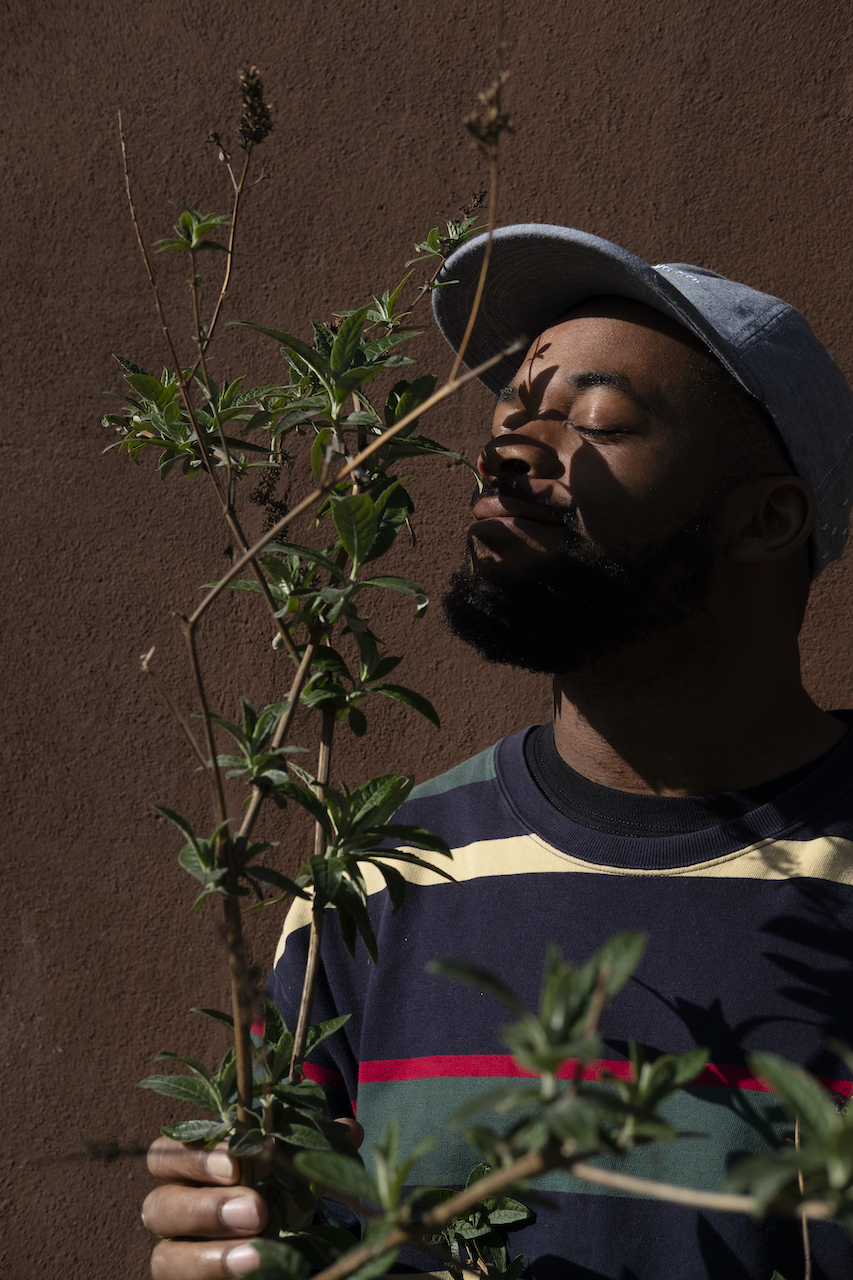This interview was originally published in Essay #12. Read about Mitchel Lingers take on skateboard schools, contests and more down below, then go watch his latest part 'Zorah' up above!
One of the worst things about working in skateboard media is doing interviews. The interview itself isn’t so bad, but sitting behind your desk after a few days of sunny skating, and trying to make sense of a shitty Android recording is not anyone’s dream job. What makes it even worse this time is the fact that about 25% of Amsterdam was having a barbecue in the Westerpark at the same time, and to top it off I got more drunk than I wanted to be and you can definitely hear that in my voice. I hate listening to my voice! Aaaaaaaaaah!
interview by sander rodenhuis in this font & frederick walker in this font
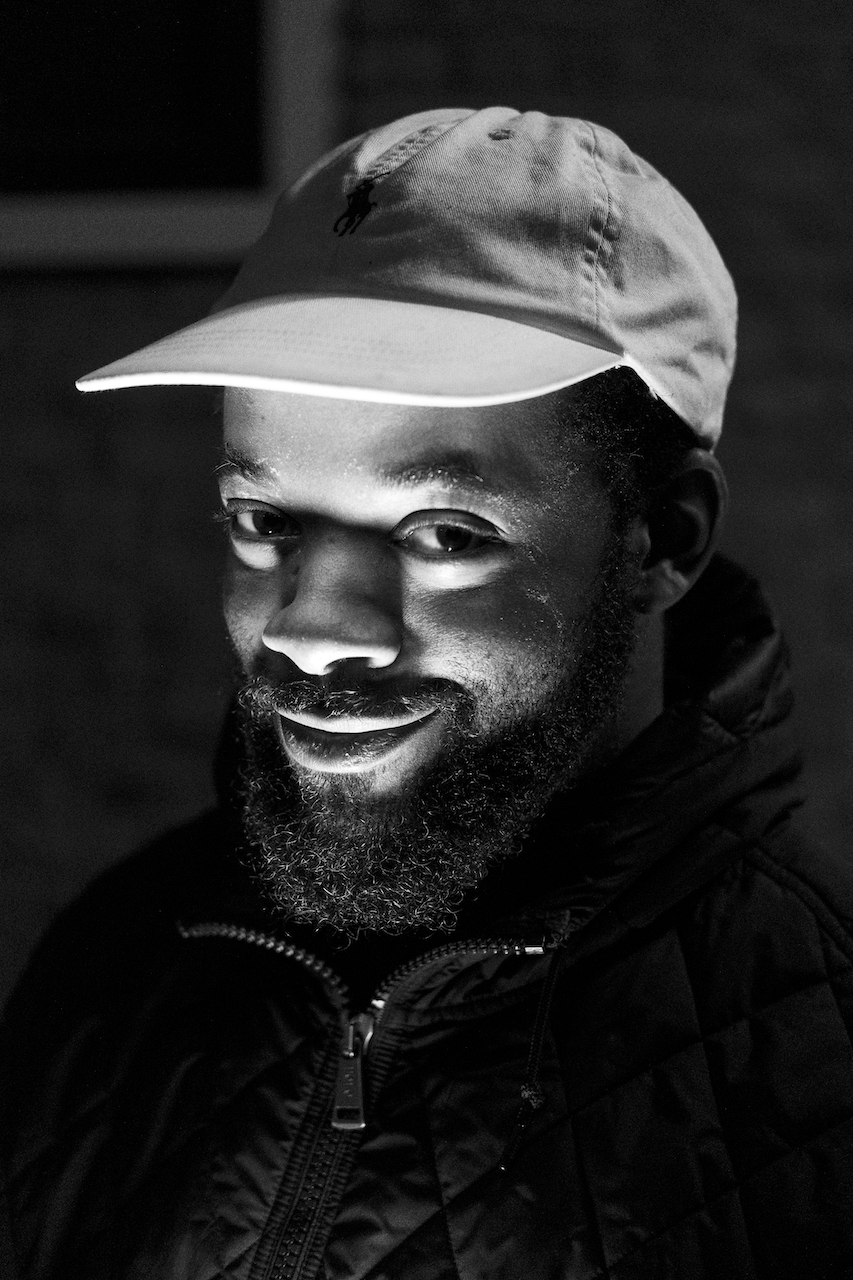
Sander: Alright, interview time. Who are you?
I’m Mitchel, I’m from Amsterdam.
Are you really from Amsterdam, or did you live in Utrecht until you were twelve, and then Rhenen until you were 20 and moved to Amsterdam for your study?
Uhm yes, that is where I am really from.
Do you still like partying?
Much less, I have a serious job now so I’m busy with that, and skating a lot other than that.
That’s a coincidence, in your Flatspot interview you mentioned a serious job as manager of a pizza joint. Has your job changed since then?
I kept the manager part and dropped the pizza portion, that’s changed into giving skateboard lessons. So right now, I’m a full time skateboard teacher, and on top of that I’m the manager and the person responsible for talent trainings.
What are the talent trainings?
Talent trainings are small groups of talents from the region of Amterdam. I train them to get them ready for big competitions. That could be a world cup, a mystic cup, the Olympics, any big contest really.
Frederick: What do you think of that compared to the way you started skating yourself? As in… no lessons, just going outside to play with your friends.
Uhm, well. Skateboarding has changed a lot since I started. When I started there were no lessons or talent groups. It was a matter of trying for yourself. You had some guys that were better and took you along, explained things, but there was no real solid base to work from. That base is there now and luckily, I’m one of the people responsible for that base. That’s really cool, giving my own knowledge to the kids and seeing what they do with it.
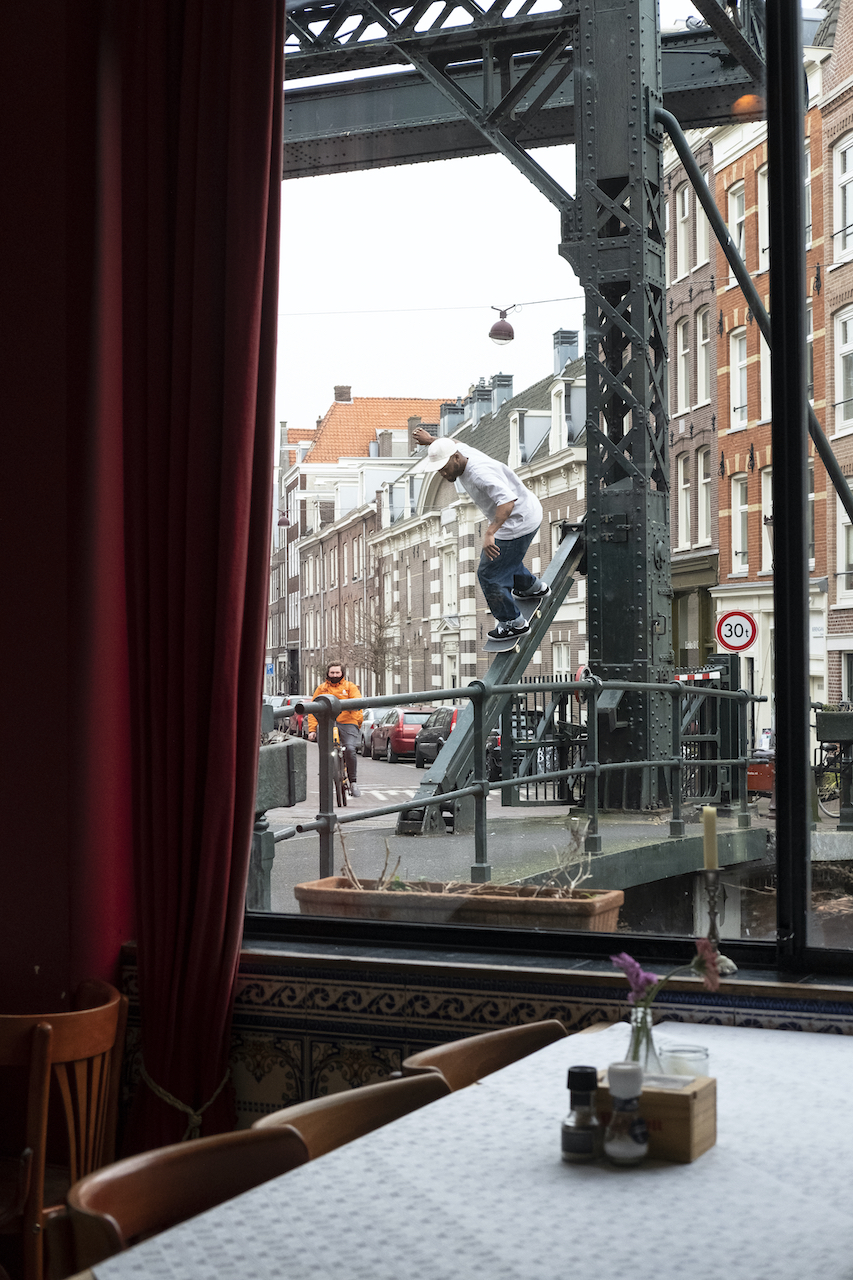
Are you happiest when you can share your own knowledge with the kids or is it even better when you see those kids shine and take a spot on the podium? As in, does it matter if someone wins or not, or is it more about being there for them?
Well, it’s always nice when somebody wins, because whenever you enter a contest, you want to win. If you don’t go into it with that mindset you’re never going to win. I think it’s really good to always get the most out of yourself and if I can stimulate somebody to do that, then that’s really important for me, and also the best part about my job, honestly. If in the end, all goes well, I know I’m not doing it for nothing.
Did you ever skate contests too?
I’ve skated contests, but that’s not my thing. I don’t like it, it makes me nervous. But I do have a lot of experience and I know what’s important for contest skaters to do, in terms of strategies or dividing your energy in a contest.
But, doesn’t that take out the purity of street skating? The whole outcast part, doing your own thing, instead of training for contests?
No, not really. Look, just because we train for a contest it doesn’t mean we’re not allowed to skate street. It’s purely the contest aspect that we train for, but we’re definitely not just contest skaters. We’re allround skaters, so we skate contests, street, bowl, park, it doesn’t matter. We’re teaching skateboarding in general. But with this contest aspect, if you want to place well - and the kids I train are able to do that - you have to do your best. So no, it doesn’t take anything away from other aspects of skating. It’s all a bonus, really. You’re already skating, you’re skating street, and if you want to do a contest, that’s your own choice. Nobody is required to, but if they want to I’m there to help and train them. If I can bring something to the table and it works out, I’m happy.
Are you noticing an increase in interest for contests because of things like the Olympics?
Well, contest skating has grown a lot in the Netherlands, which wasn’t always the case. So I think that the whole international part of contest skating has landed now, more than when you compare it to the time I started skating. And you can see that, and we, as the Netherlands, want to take part in it. The Dutch women, Roos, Candy, Keet, are already performing on a high level. and now the men want to follow.
Why are the men less prominent?
Well, I wouldn’t say the men are less, but…
It’s a smaller platform for women.
The platform is indeed smaller, and we simply have really good candidates, and for the men… well, in foreign countries they’ve been working on it for longer so naturally, it’s bigger there. In the Netherlands we’re a bit behind, but the momentum is coming. So, now we have to get the men on the same level as the men in other countries are.
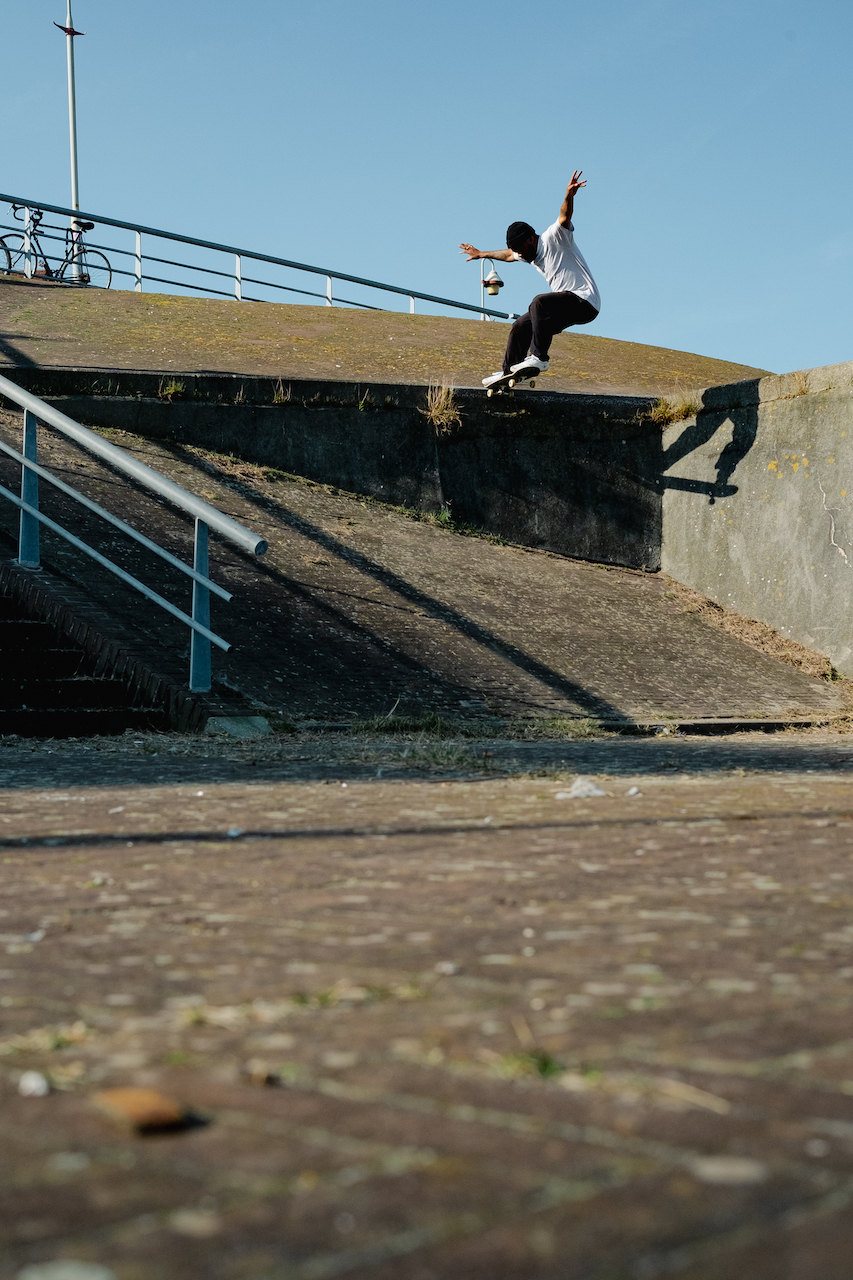
How do you propose to do that? How do you get a Rob Maatman or Lars de Weerd so far to take part in all competitions out there?
I think it’s important that we start now. You don’t have to aim for the win, but taking part paves the way for the next generation. We have a lot of young talents walking around who are doing super good, but are missing the base. See, when these older guys take part in the contests and make a name for the country, it opens a way in terms of financial support and attention for the younger kids, who will profit more than the older guys can. So really, it’s just super important to start somewhere and continue on that path, and then hope the next generation gets stoked in turn, to eventually make the next step themselves.
So you think it’s important that, even if they wouldn’t want to win, the older guys use their position to make an example for the kids?
Of course, these kids look up to you. There are a lot of older guys who never lifted off in terms of their career. But the talent is there, and they can definitely skate contests. They can open things up for the younger generation, and that’s slowly happening. So I think it’s good to start somewhere, so the rest can follow. I mean, it doesn’t need to be within two years from now that we’ll be at the Olympics, but if we don’t put everything we have into getting to an international level, it’s never going to happen. You want the younger kids to experience contests already to give them the feeling and experience. It’s not about winning but gaining experience, and feeling comfortable when something is on the line. I think it’s fun to participate as well, for them.
Is there a difference in kids you teach where some lean towards contests and others don’t care about it?
Absolutely. And that’s normal, I didn’t like skating contests at all. I would rather watch than skate one myself, I found it too stressful. But in the end I know what the right strategy is for my students, like not spending all your energy in the first heat when there’s still a long way to go. Those are the things I can teach, as they don’t have that experience yet.
Personally, I think it’s always a grey area, teaching and skating. You can teach them the basics, pushing, kickturns, maybe an ollie, but what I’ve experienced myself is that from that moment on, your own will is the most important thing. Pushing through and really going for it. So that’s why teaching can be good, but still a weird or tricky thing.
It’s difficult for sure, but I have a few kids who I’ve taught an ollie, and they’re my talents by now. They can do flip front boards now, and backside 360’s like it’s nothing. So it does work. I teach them an hour each week, the rest is up to them. I give the knowledge, they do the rest.
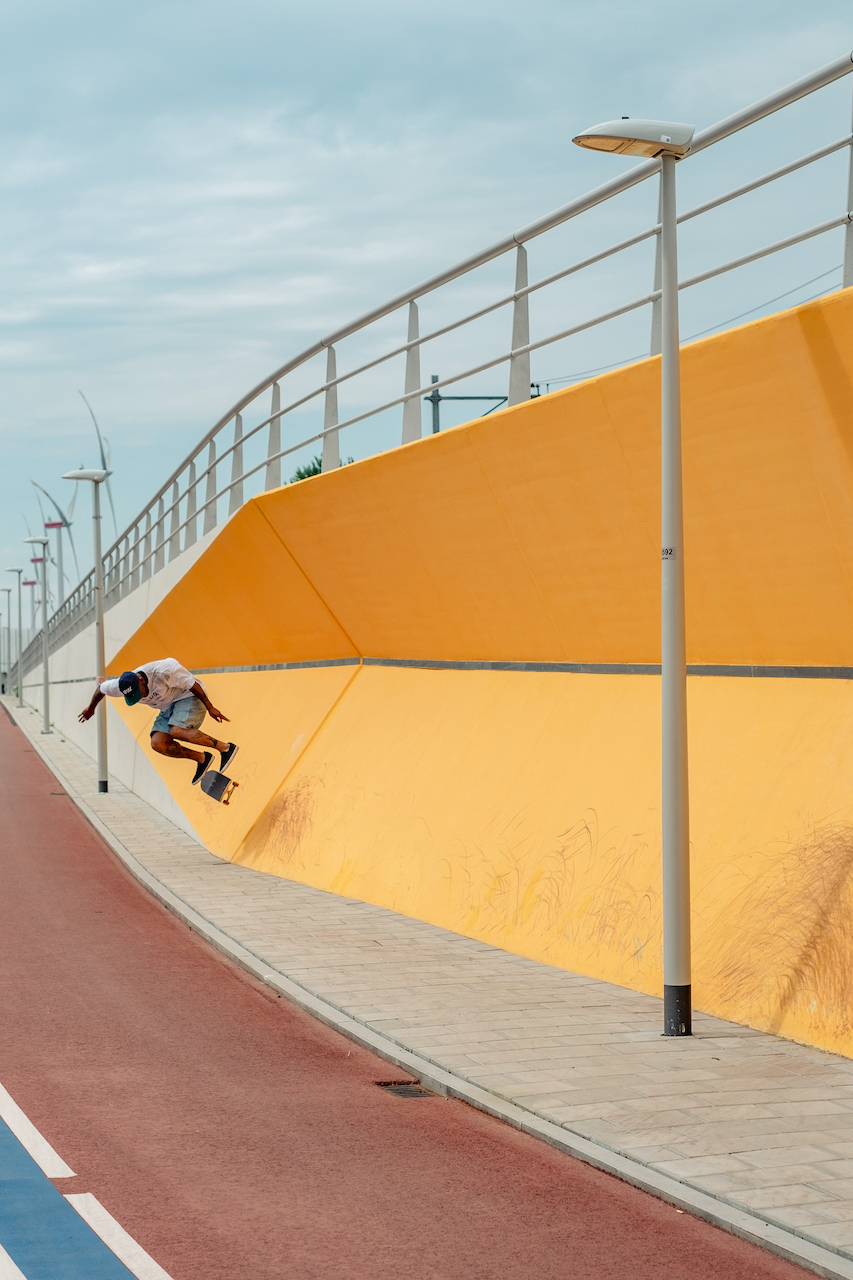
So they’re really talents instead of some kids who are good in class, but don’t do anything outside of it.
For sure. You can’t be a talent from only the lessons, you have to skate outside of it as well. The more hours you make, the better you get. That’s how it works.
Do you see kids from pushy parents that don’t really like the lessons?
We get them too, yes.
Football parents.
That’s because back in the day, you couldn’t put your kid on skateboarding, but these days the lessons are a normal thing. It’s the same as tennis, football, hockey, it can be fun for a week and then they’ll want to do something different later. That’s fine, I teach those kids for a season and if after one season they feel like doing something else, then that’s totally fine. You shouldn’t force a kid to do something he or she doesn’t like. If kids like it I can be a lot of help for them, and if they don’t like it, I can be happy if I gave them a new experience.
Last thing about the lessons. I know Nick Bax has bullied you for a bit, because at Skateboardschool Noord, you use a skate passport. How does that work?
Uhm, a passport is basically a combination of tricks of which we think you can do them, at a certain moment in a certain level. In a level there’s 18 lessons, and there are an x amount of tricks, basic tricks, that should be doable within that level. If it doesn’t work, then that’s fine. But if you want to teach and make the kids better – we teach 500 kids – then you have to find a structure. So the passport is a structure, a guideline, in which we say, alright, if you join our class for one hour a week and want to learn something, you follow our program. What you do outside of it is up to you, the passport is purely for the basics to then learn the standard tricks later on.
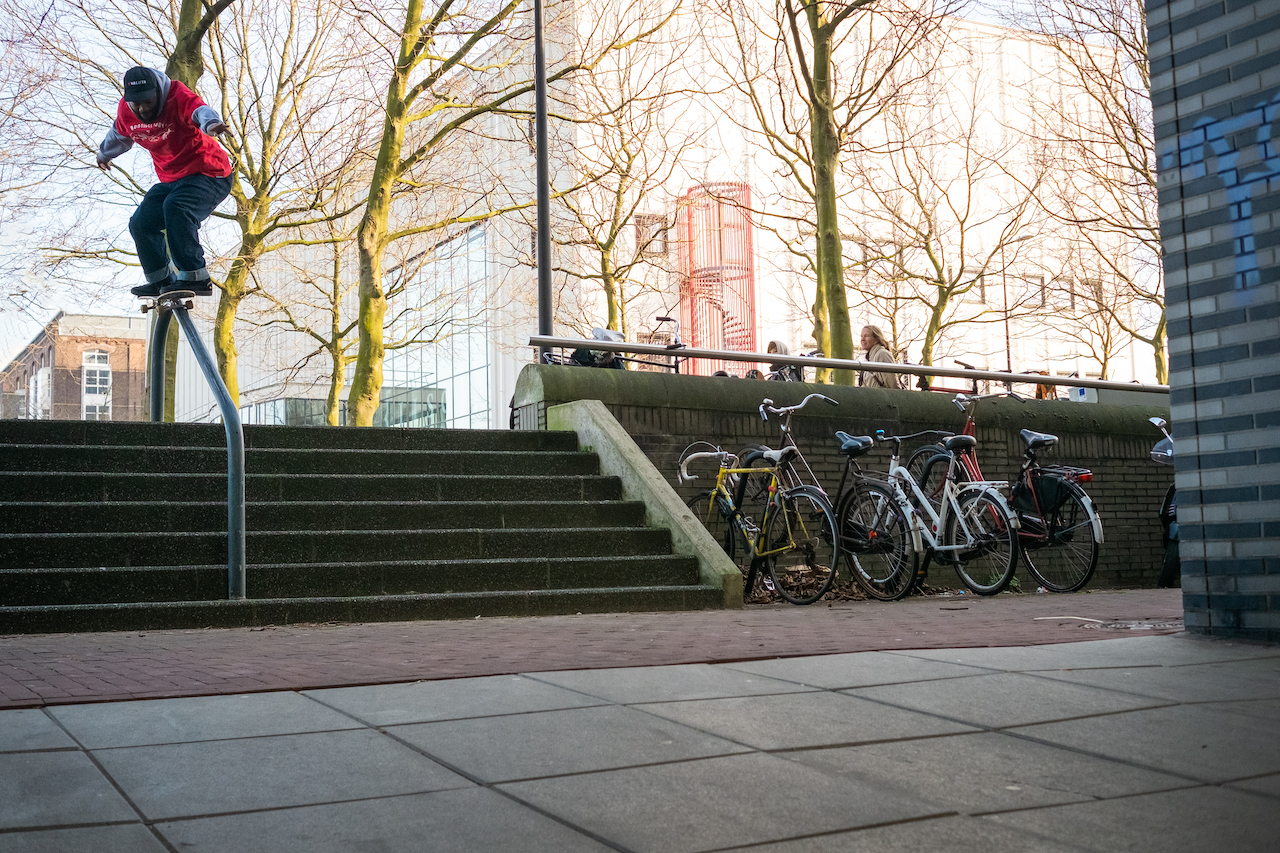
Are you not scared of some sort of competition between the kids?
I heard Bax say that, that that’s his crochet point. Kids get more points or marks in the passport, which creates this hierarchy in which some kids are better or higher than others. Do you see that happen?
No, it’s more so that they hype each other up, and that the better kids explain stuff to the kids who need a bit more time. And they make the level of a class higher in general. So instead of a competition it’s more a thing where they show the other kids that something is possible, especially since they started at the same level. So, they function as an example for the rest. If somebody is not as good as the rest, that’s fine, that means that you still have a lot to go for. And by simply practicing the basics you can get anywhere.
Is that the case, that anyone can reach anything?
It depends, not everyone is equally good in skating.
Is a passport system fair then? Because at the end of the day, you’re still going to compare levels.
Why would that be fair or unfair? If you skate longer and have more experience, you’re going to be better than the other kid. It means you put more hours into it. So there’s nothing unfair about, if one kid gains more experience he’s going to have a higher level. If you’re in level six, you probably put twice as much time into it…
But it’s not always experience, is it? There are kids that skate two years, and kids who skate six months, and they still do more tricks than I do.
Right, but that’s fine, not?
It’s alright.
Doesn’t everybody learn at their own tempo?
Yes, but I will probably never reach the same passport level as them. Can we then still speak of a sustainable system?
Yes, because that’s how it works in the real world too, right? If you don’t have a passport… one skater starts skating and turns pro in two years, the other spends his whole life trying to learn a kickflip. So the passport doesn’t matter then, it’s not decisive for how fast you learn things. The passport is just a structure.
So, wouldn’t it be better if only the teachers used the passport?
No, because the kids like to see their own progression too. And we have… we do that too, we see their progression. But they think it’s important to see too. And again, it’s only coming from the skateschool. If they want to do bonelesses instead of kickflips in their own time, that’s fine, do it. If they land one, equally as sick. But if you want to work with a structure, which is what the kids want because they got on lessons anyway, then you work with our system. If we didn’t have a system, we wouldn’t have anything to track progress and it wouldn’t make any sense at all.
Clearly. It’s not meant as a critique of the system, but more to gain some understanding into it.
It’s good to be critical.
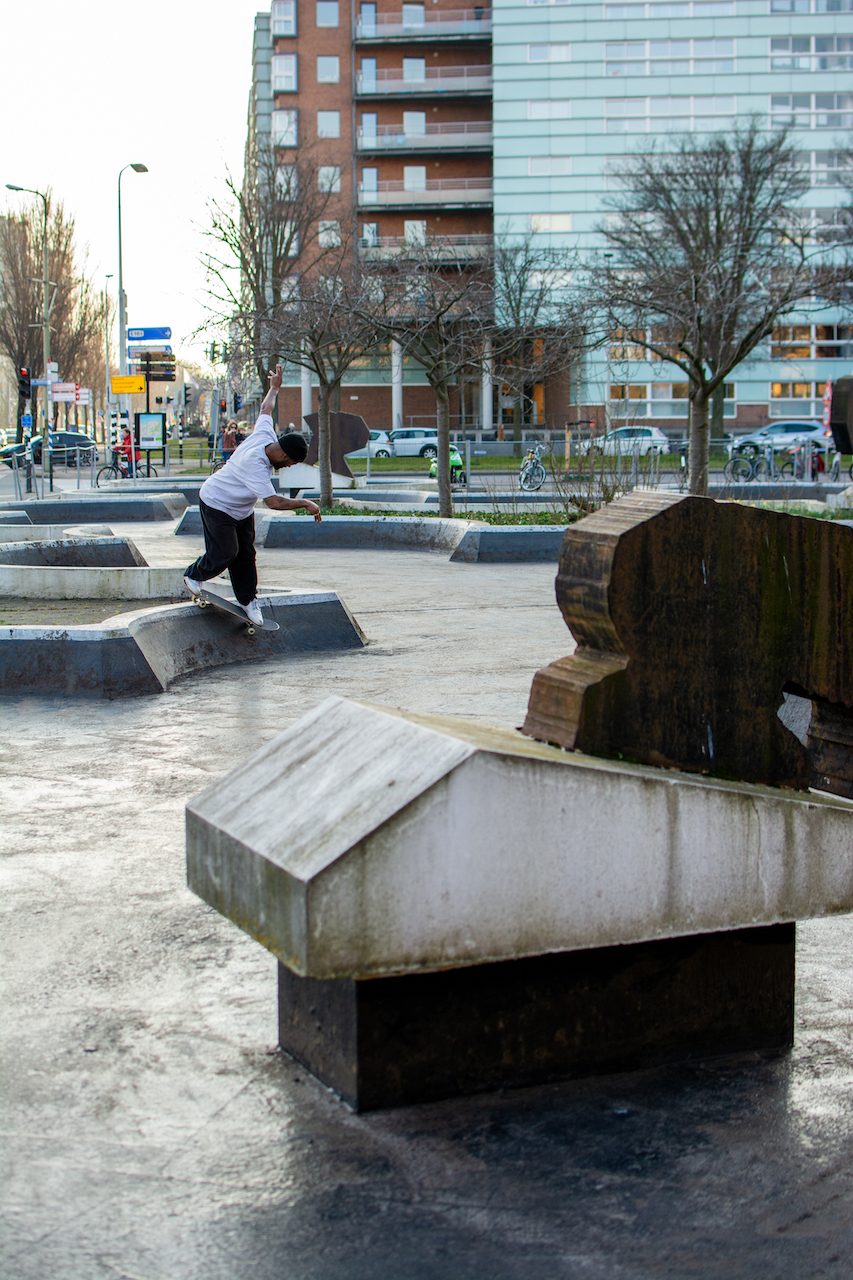
You can think the same about tennis, for example. I used to play tennis and the only way to get a better level was by playing games, but if I would only train and get better my level would still be the same for the system.
I mean, contest skating is not for everyone, and it shouldn’t be. You’re nothing less of a skater if you don’t do contests. Everyone has their own interests. You’ve got people who like vert skating, bowl, street, contest, it doesn’t matter. Everydone does what he or she likes to do, and if you like contests… I don’t like them but I like to train people for them. It’s my job.
What are your ambitions of growing within this field? Can you get to an Olympic level?
For sure. I have a student, Jason, Jason Lijnzaat. We’re going to do bowl training for the biggest contests out there for him, like the world cups or Olympics, and he can definitely get there. It’s the same as the women, there are chances, but you have to aim high and go for it, otherwise nothing will happen.
You can do some proper skating yourself, but where you do a fs ollie of 1.20 meters high, Jason doubles that. How can you help Jason when he’s the “better” skater?
I have a lot of experience with logical lines, I look at a lot of contests and see that there’s a certain amount of time in which…
What you see with young guys like Jason is that they go all in in the first heat, straight away. They think that you have to show all the difficult tricks in the first run, even though that isn’t the best idea. Usually, you would do two runs that are the same to set a good score, and then in the last run you try out the tricks of which you know there’s only a 50/50 chance that you’ll land them.
Yes, I really think this certainly happens with the younger kids, who I’ve watched and analyzed during the Dutch championships.
How do you analyze them?
I just go and look at what they’re doing at that moment and how many rounds they’ve done already. If they made it to the semi-finals but have used all of their energy, you know they didn’t think about how to put their runs together. They have to ask themselves, do I want to start with the hardest trick, like a flip front board, or with a trick that I know I always land. So during the Dutch national championships I saw that some of my students started with their hardest tricks, which they had to bail twice. Of course you’ll ruin two out of three runs already. I’ll then give them advice about how to order their tricks, so that there is less chance that they will have to bail in a run.
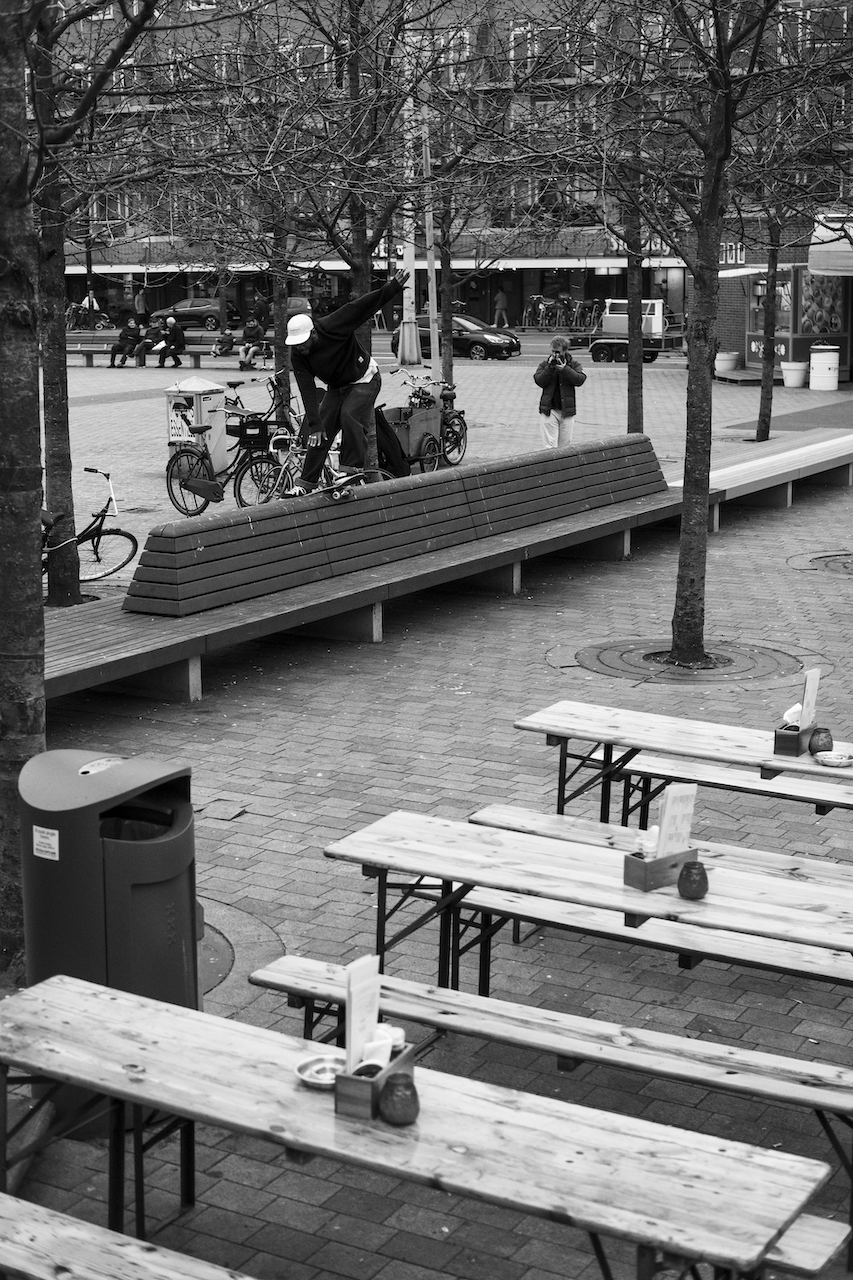
So your training is more about tactics than about technique?
No it’s definitely both. I am quite experienced with tricks, I’m definitely a skate nerd. I always look closely at how people do a trick and how I do these tricks, which I can then convey to other people. This is also the reason I’ve been teaching skatelessons for the past five years, because I always pay close attention to someone’s posture, placement of their feet, how they approach the obstacle. All those little things you wouldn’t pay attention to yourself are things that can really help you advance your skating technique.
Prior to a competition, do you get to see the parcours?
No, but it is always the same in street league. There’s a big section with a big staircase, a hubba, two rails, a bump to bump, bump to rail, big quarterpipe. So you always already have an idea of what the park will look like. You will have to assume people want to see a flip trick, a rail trick, a big hammer, and something to end with.
Do you then also make a list with possible permutations and routes? Flip over the hip so you can do a bs smith on the rail, kickturn and do a back lip?
In my head, yes. I make an analysis: I know all the tricks my student can do, and I know how much time it costs do a trick, so I know there’s always at least five tricks that can be done in a run, which you have to anticipate. And you have to have a B version: when one trick doesn’t work, you try to land a slightly easier trick.
So you never give someone a list with tricks on a post it note, for them to complete?
No, these things do have to feel organic, skaters aren’t robots.
You also make this analysis on what the skater can do and what the park looks like.
Exactly, there are options. People always hate on the idea of learning runs, but if you want to be good in skateboarding you have to do certain things on repeat. If you want to have a good kickflip, you will have to keep practicing it. All this hate on practicing tricks makes no sense to me. Really good skaters do the same tricks day in and day out, so that it can become like a routine. Not a single pro will do a trick they haven’t practiced a thousand times before.
Enough about contests, passports and kids.
Kids! We have to talk about kids! You’re becoming a dad soon!
Yes, you got that right, I’ll become a dad.
Is it going to be a girl or a boy?
I will have a fantastic daughter.
A daughter! In a way it’s a shame because I would like to see a small, identical version of Mitta.
You have no idea, I think my daughter will be the best version of me possible.
They say that when women live together, they make a bigger mess than men who live together.
Well, I disagree. No, I think this is going to be great. I am hyped, I’ll have my babygirl in my hands in four months which will be the sickest thing there is.
Will she have a passport?
Only if she lands her tricks. Not giving these out for free.
Do you see yourself becoming like a soccerdad-type of person? Like, I can do a back heel, you make sure you do a back heel by the time you’re 10 years old.
I am not really a big fan of soccer dads and moms, I think my child will do what she’s hyped about and I will support her. We’ll see about everything else. I hope I can get her interested in skating or ceramics, it’s all good!
I am personally hyped you are becoming a dad.
Me too!
I can’t wait until the little girl is here.
For sure, you’ll be a god-uncle!
Essay media team god-uncle!
We actually live next to each other, so when that baby has to be dropped…
Snackbar Jan in the middle!
Snackbar Jan!
We always go to Snackbar Jan when Sander is here.
Neighbour!
That’s a great place dude, whenever you’re in Amsterdam it’s the place to be.
Neighbour!
The curry is the only thing that isn’t that good.
And the fries aren’t always good, but he does always have good music.
Alright, there is half an hour of conversation left but honestly, we got more drunk than needed and I can’t stand my own voice anymore. I think this part of the interview is already a really good indication of the person Mitta is, and if you really want to know more about the way he skates, or about slams he had, send me a message and I’ll send you the complete recording.
